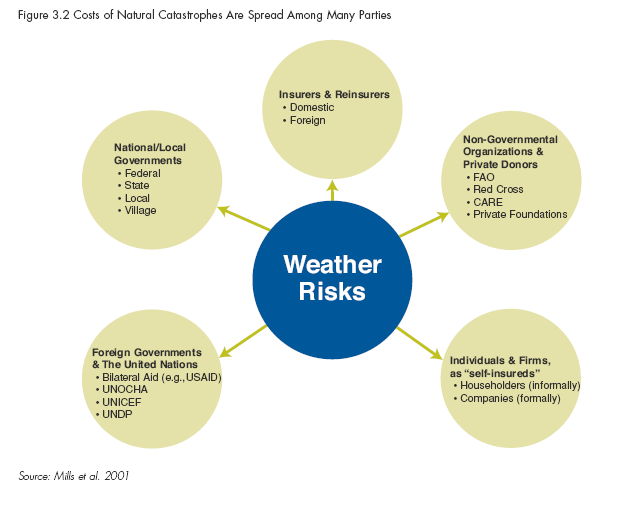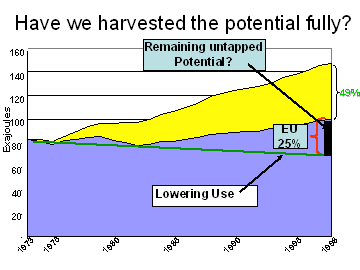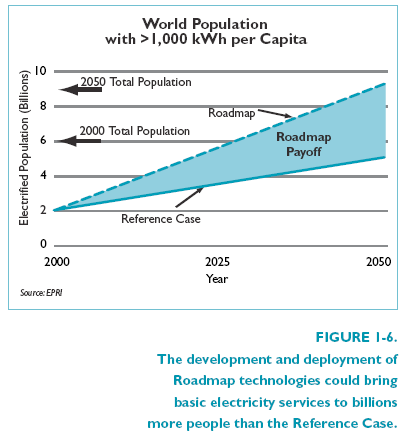Det har kommit en departementspromemoria, DS 2005:51, om energieffektivisering i bostäder och lokaler och som bl.a. bygger på Miljövårdberedningens förslag som kom för c:a ett år sedan. Miljövårdsberedningen föreslog en strategi med fyra ansatser och promemorian berör dem men missar helheten i de fyra delarna. Hög ribba fordrar inte bara bra ansats utan också spänst i hoppet.
Miljövårdsberedningen föreslog att:
A. Skapa en strategisk plattform genom att inrätta en beredning som tar fram en vision för ett energieffektivt Sverige och som sätter nationella mål som kan brytas ned på sektorer.
DS 2005:51 ansluter till målet men vill använda “viktningsfaktorer” för olika former av energi och har inget med om själva plattformen exekutiva del (beredningen)
B. Stimulera teknikfronten genom att
- inrätta en funktion för utveckling och spridning av ny teknik
- utveckla teknikupphandlingen
- förstärka forskning, demonstration och internationellt samarbete för att få marknadens medverkan i utvecklingen
DS 2005:51 ansluter till huvudtanken men undviker preciseringar om tillvägagångssätt och innehåll
C. Göra staten till en marknadsbrygga
- Statens fastigheter skall föregå och utmana andra aktörer, upphandla från den bästa kvartilen, göra Vattenfall till en spjutspets för energitjänster.
DS 2005:51 ansluter till tanken men avstår från att precisera mål som t.ex. att inrikta sig på den bästa kvartilen.
D. Stärka den breda implementeringen
- Skapa en motor för genomförandet, t.ex. med en effektiviseringsfond
- Verka för effektivare och mera transparenta priser
- Utveckla de ekonomiska incitamenten i fastighetstaxering, lån, bidrag, klassificering, märkning, fondering mm
- Skärpa regler för planering och byggande så att effektivisering tillgodoses.
- Öka kunskapen genom rådgivning och utbildning
DS 2005:51 tar upp flera aspekter på de ekonomiska incitamenten och föreslår dessutom en effektiviseringskampanj men med huvudinriktning på medborgarnas attityder
Miljövårdsberedningen har utgått från en syn på omfattande och total marknadsomställning där flera element måste fungera tillsammans. Resultatet (R) är en funktion av Potential (P) och Acceptans (A), se figur.
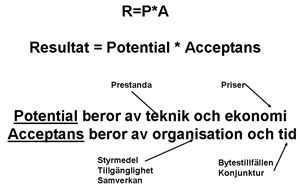
Och en marknadsomställning måste omfatta både framkant, mitt och bakkant på markanden, se nedan.

Skrivet av Hans Nilsson, 2005-11-29.
(0) Kommentarer •
(0) Trackbacks •
Permalink
eller vad den skall heta är tillsatt men uppgiften är ännu inte formulerad. Det är kul att se att Leif Johansson från Volvo ingår eftersom han under sin tid som VD vid Electrolux var pådrivande till deras medverkan i teknikupphandlingar för effektivare kylskåp. Det var en positiv erfarenhet som han förhoppningsvis har i gott minne. Det är också bra att man valt nya krafter som Lotta Bångens (ordförande i Energirådgivarna) att medverka.
Kommissionen för att bryta oljeberoendet i Sverige till år 2020 är, vid sidan av Göran Persson och Stefan Edman:
Leif Johansson, vd Volvo lastvagnar
Birgitta Johansson Hedberg, vd Lantmännen
Lisa Sennerby Forsse, Professor, Formas
Christian Azar, Professor, Chalmers
Lotta Bångens, ordförande för Energirådgivarna
Lars Andersson, fd ordförande Eskilstuna energi och miljö
Christer Segersten, ordförande Södra skogsägarna
Göran Johnsson, fd ordförande Metall.
Skrivet av Hans Nilsson, 2005-11-28.
(0) Kommentarer •
(0) Trackbacks •
Permalink
World Energy Outlook 2006, WEO, är nu tillgänglig. Skriften går denna gång rakt mot dagsproblemets hjärta genom att särskilt behandla energisituationen i mellanöstern och nordafrika, MENA-länderna. De länder där de största oljereserverna finns och där den politiska situationen är särskilt komplicerad.
Skriften innehåller stora utrops- och varningstecken för framtiden och är ovanligt tydlig i sina påpekanden att det ABSOLUT behövs ny politik i alla länder för att ändra rutten mot ökat oljeberoende, stigande energipriser och ökade miljö- och klimatproblem. Man prisar G8 för deras initiativ till förändring och de senaste svenska utspelen om att bryta oljeberoendet får ytterligare underbyggnad. Bra timing!!
Men precis som med klimatfrågorna kommer man inte att se några snabba och avgörande effekter. Det är ett mångårigt ihärdigt arbete som måste inledas och som förhoppningsvis inte skall innebära allt för stora politiska motsättningar. Kan producentländer och konsumentländer föra en meningsfull dialog, som man redogör för i WEO, och i samma syfte, så skall väl konsumentländerna internt kunna medverka?
Om konsumentländerna tar itu med problemen på allvar bedömer WEO att de kan minska sin efterfrågan 10% i förhållande till referensscenariet, som innebär att fortsätta som hitintills. Även om detta sker så ökar energianvändningen från dagens nivå med 37% och med olja som den viktigaste resursen. Dock bedöms kolanvändningen minska och biobränsleanvändningen att öka. Båda i omfattande grad vilket har en avsevärd påverkan på koldioxidutsläppen. Icke desto mindre ökar dessa med när 30%!!
Så det är ingen ljus framtid som WEO ställer i utsikt utom möjligen i det att den visar på att stora politiska beslut krävs och att de också har effekt om de genomförs. Låt oss visa att vi kan bättre! Let us walk that extra mile!
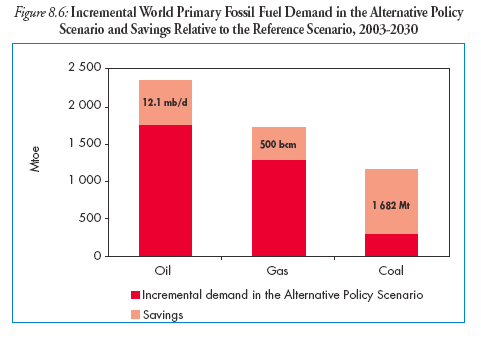
Skrivet av Hans Nilsson, 2005-11-08.
(0) Kommentarer •
(0) Trackbacks •
Permalink
Vid ett möte i London den 1 november försöker man knyta in Kina i kretsen av länder som gör åtaganden vad gäller växthusgaserna. Det är bara ett element i en hagelsvärm av initiativ som tas i EUs ordförandeland. Utspelet av Stefan Edman i DN och dess mottagande av regeringen kanske är en signal om att Sverige (äntligen) vill vara med.
Men goda gärningar börjar hemma och The Independent erbjuder en lista på 10 åtgärder som Storbritannien bör vidta själv. Den nya kommissionen kan börja med den, möjligen med undantag för punkt 10!
———————Här följer sammanfattningen av mötet i London 1 november 2005——————————————————-
The chairman’s conclusion
Our meeting today marked the first Ministerial meeting of the Dialogue on Climate Change, Clean Energy and Sustainable Development launched at the G8 Summit at Gleneagles on 6-8 July.
It was attended by Ministers and senior officials with responsibility for energy and environmental issues from the G8 and from Australia, Brazil, China, India, Indonesia, Mexico, Nigeria, Poland, South Africa, South Korea, and Spain, and by senior officials from organisations including the World Bank, UN Framework Convention on Climate Change, Intergovernmental Panel on Climate Change, International Energy Agency, and the United Nations Environment Programme.
Our discussions were complementary to the UN Framework Convention on Climate Change, including its ultimate objective to stabilise greenhouse gases in the atmosphere at a level that prevents dangerous anthropogenic climate change, and to the Kyoto Protocol.
Our discussions focused on the serious and linked challenges of tackling climate change, promoting clean energy and achieving sustainable development globally.
The Gleneagles Plan of Action on Climate Change Clean Energy and Sustainable Development
We took note of the Plan of Action agreed by the G8 countries at Gleneagles, including the considerable progress since July in taking forward implementation. In particular, we took note of:
the successful launch by the World Bank of work to develop a comprehensive framework for investment in clean energy and sustainable development;
the analysis of the International Energy Agency on alternative energy strategies and the work programme it has agreed to promote action on energy efficiency and cleaner coal;
the range of national and international activities undertaken by G8 countries to implement individual commitments in the Plan of Action, and their willingness to explore opportunities to build on this progress.
Strategic challenges of climate change, clean energy and sustainable development
Roadmaps for the transition to a low-carbon economy
We explored the timescales on which technologies need to be developed and deployed to meet our goals for a secure and sustainable energy future and to avoid the worst impacts of climate change.
We noted that greenhouse gas emissions must slow, peak and decline and will need to be reduced to well below the levels we see today. We heard that to stabilise greenhouse gas concentrations at, for example, twice their pre-industrial level, global emissions would have to peak in 2030.
We recognised the value of setting out clear pathways to achieve our shared goals for climate change, clean energy and sustainable development, including:
the role of national strategies and action plans which set out the timescales to develop and deploy low carbon technologies;
the need for roadmaps to help accelerate the development of lower-carbon technologies in particular sectors;
the need to balance long-term goals with clear priorities for short term action;
the need to motivate action by individuals and businesses, including through raising public awareness.
We identified a number of short-term priorities including interventions to stimulate the up-take of existing energy efficient products by consumers, and to avoid costly mistakes in the next generation of energy infrastructure investment.
New approaches to technology cooperation
We noted the importance of strengthening both research into new technologies and the deployment of existing technologies, which depend both on national policies and on international cooperation.
We explored the concept of new paradigms for international cooperation on climate change, put forward at Gleneagles by China, India, Brazil, South
Africa and Mexico, to promote wider access to cleaner energy technologies and accelerate their deployment.
We heard about regional initiatives, such as the EU-China partnership (including action to develop and demonstrate near zero emission coal technologies), the EU-India Initiative, the Asia Pacific Partnership and work to scale up financing of low carbon infrastructure stimulated by the Economic Commission of Latin America and the Caribbean.
We agreed that it would be valuable to develop our work in this area, focusing on the ideas put forward today:
identifying priority areas for cooperation between developed and developing countries and considering goals for short-, mid- and long-term cooperation on key areas;
assisting developing countries to improve the enabling environment for the transfer of technology, including through the policy, financing and regulatory frameworks and through examining the role of intellectual property rights;
exploring new approaches to finance technology acquisition and transfer.
Scaling up investment in clean energy technologies
Major investment is needed in energy infrastructure to meet energy needs and tackle climate change. The majority of this investment will come from the private sector. Clear policy signals are needed to channel it towards lower carbon technologies.
We heard that there is no shortage of appropriate technologies that can be deployed in the short term to reduce our carbon emissions. The challenge is to create the incentives for private sector investment, including through market-based instruments and carbon finance. “Long, loud and legal” frameworks can accelerate the commercialisation of cleaner technologies.
We noted that emissions trading in Europe is going well and providing a powerful incentive for investment in reducing emissions in the near term.
Parties to the Kyoto Protocol highlighted the importance of the Clean Development Mechanism and discussed proposals to reinforce it and improve its operation.
We welcomed work by the World Bank, regional development banks and Economic Commission of Latin America and the Caribbean to increase
investment in lower carbon technologies in developing countries and emerging economies and to pilot new and innovative approaches.
We also noted the need for appropriate frameworks to provide incentives in R&D for the next generation of clean energy technologies, and to overcome the “valley of death” in which promising new technologies fail to achieve their commercial potential.
Next steps
We acknowledged that the UNFCCC remains the appropriate forum for negotiating future action on climate change, and looked forward to working together to advance the global discussion on long-term cooperative action to address climate change at the UN Climate Change Conference in Montreal later this month.
The parties to the Kyoto Protocol also looked forward to their first meeting in Montreal and to ensuring that the Protocol is working effectively to deliver its contribution to the ultimate objective of the UNFCCC.
We welcomed the Russian decision to focus on energy as a key theme of it G8 Presidency in 2006, and the offer from Japan to receive a report on the Dialogue at its G8 Summit in 2008.
We noted that the World Bank will bring forward proposals to its Spring Meeting on a comprehensive framework for investment in climate change, clean energy and sustainable development, and that the IEA will deepen its work on alternative energy strategies and strengthen its outreach to developing countries. We welcomed the continued commitment of both organisations to work with interested countries to help ensure that cleaner technologies are deployed as quickly as possible.
We agreed that we should take forward and deepen our discussions on climate change, clean energy and sustainable development. We noted that Ministers and officials with other responsibilities, including for development and finance, might wish to become involved in taking forward discussion of relevant topics, including adaptation.
We welcomed the offer from Mexico to host a Ministerial meeting of this Dialogue in 2006.
Skrivet av Hans Nilsson, 2005-11-02.
(0) Kommentarer •
(0) Trackbacks •
Permalink
![]() I tidskriften Forbes finns en intressant artikel med några exempel och en omfattande lista med länkar som borde kunna inspirera.
I tidskriften Forbes finns en intressant artikel med några exempel och en omfattande lista med länkar som borde kunna inspirera.





